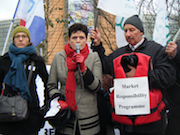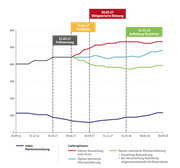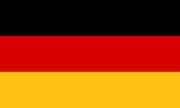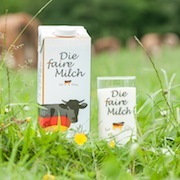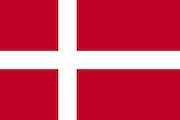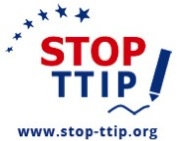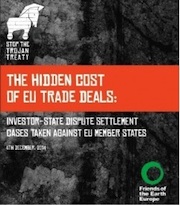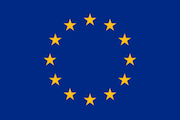EMB Newsletter January 2015
- Symbolic action campaign (11 December 2014)
- Additional crisis instrument: the Market Responsibility Programme
- The situation in Germany
- Fair Milk in Germany
- The world of dairy farming from a Danish perspective
- Interview with Jonas Vilionis, President of the Lithuanian Milk Producers’ Association
- US study points up worrying disadvantages of TTIP
- Report on the Investor-State Dispute Settlement (ISDS)
- Brief news from Brussels
- EMB Agenda
Newsletter as PDF
Contact
EMB - European Milk Board asbl
Rue de la Loi 155
B-1040 Bruxelles
Phone: +32 - 2808 - 1935
Fax: +32 - 2808 - 8265
Dear Dairy Farmers and Interested Parties,
Another crisis is upon us. It follows that of 2009, which featured the milk strike and the spreading of milk on fields – and even worse, that of 1983, the major crisis of milk overproduction that led to the implementation of the quota system.
Whenever there’s a crisis the weak links get the worst of it: the consumers, seeing a decrease in security and food quality, but especially the producers, who, unable to make a profit, all over Europe are giving up farming. The untamed liberalism advocated by financiers, the private and co-operative agro-businesses – under the pretext of competitiveness and trade surpluses – is wreaking havoc in the countryside. The Milk Package, the intervention by producer organisations and the inter-branch organisation are just “spin”. An association and political microcosm is toying with the citizens like a cat with a mouse before crunching it.
Competitiveness will only be possible if the milk price covers production costs in the long run. In 2015 the EMB will continue to fight for the implementation of a crisis management and prevention system. This is the indispensable cornerstone in the construction of a competitive European milk sector. We will be tireless in lobbying the Commission and the European Parliament in defence of the producers and in favour of our plan. We will return in our thousands from all over Europe, more determined than ever to achieve a fair milk price.
A happy New Year to all, and see you soon in Brussels.
Paul de Montvalon, Member of the EMB Board and APLI France
Symbolic action campaign (11 December 2014)
EMB press release
European milk producers demand that EU politicians act – gear milk production to market demand!
(Brussels, 11.12.2014) German Chancellor Angela Merkel, French President François Hollande, EU Commissioner for Agriculture Phil Hogan: Europe’s rulers are up to their necks in milk, they are in danger of drowning in the white stuff. This was made crystal clear by the European Milk Board (EMB) in a dramatic protest with a milk lake outside the EU Commission’s building today.
Dairy farmers from all over the EU gathered in Brussels to warn the politicians of a new catastrophe looming in the milk market. “Unless something is done quickly, Europe’s milk producers will go under”, warns EMB President Romuald Schaber. “We want to send out a signal today and are open to dialogue. If the Commission fails to meet our demands, we will organise spectacular major demonstrations over the next few months”, adds Erwin Schöpges, member of the EMB Board.
The milk price has been in free fall throughout Europe for months now. In many countries like Belgium, France and the Netherlands the price will drop well below 30 cents a kilo in the New Year. “The situation is getting worse and worse. Many producers have major difficulties paying their bills and are worried they will no longer be able to pay for feed for their cows”, says Schaber. The countries currently hardest hit are the Baltic states. Lithuanian farmers, for instance, are being paid only between 18 to 20 cents on average. In Latvia the milk price is between 22 and 24 cents at the moment.
Europe awash with milk
The reason for the plight is the same throughout Europe: “The situation is drastic. We are currently truly awash with milk – this year the EU will have produced about 7.5 million tons more milk than last year”, says the EMB President. The increase in the milk quotas for ideological reasons, oblivious to the real market situation, was already exerting severe pressure on the market, even before the quotas are fully abolished on 31 March 2015. “Supply is exceeding demand by a long chalk. Without the limiting effect of the quota system in key producing countries like Germany and Holland, the situation would be a lot worse now”, Romuald Schaber explains.
Meanwhile every indication points to an impending severe market crisis like that of 2009. Then the prices in the EU plunged to 18 cents. The situation has been exacerbated by the Russian ban on dairy product imports from Europe since early August. When the last limiting system – the milk quotas – ends next year, there is a very real risk of another price collapse. Then many farms will see a severe threat to their livelihood, says Schaber.
An additional crisis instrument: the Market Responsibility Programme
Meanwhile there has been no reaction from the politicians. “The politicians know that the existing crisis instruments such as intervention and private storage are nowhere near enough”, exclaims the EMB President. The dairy farmers do not want subsidies; they are urging policy-makers to implement the Market Responsibility Programme (MRP) developed by the EMB. The programme provides for creating effective incentives for the farmers to adjust the volumes they produce to the market. When demand picks up again, normal production can be restored.
“Without an additional crisis instrument like the MRP, Europe’s milk producers and many rural areas will face catastrophe”, Romuald Schaber warns. “Europe’s rulers can no longer turn a blind eye to this.”
Hanna Vauchelle, EMB
Additional crisis instrument: the Market Responsibility Programme
30 cents in France, 25 cents in Belgium and now only about 20 cents in Lithuania: the milk price is in free fall in Europe. At the same time the milk lake is growing. Some 7.5 million tons more were produced by the European dairy farmers in 2014 than in the year before. More and more indications, then, of a crisis like that of 2009.
“Production is totally ignoring the market”, says EMB President Romuald Schaber. That is why it is even more important for the EMB that the policy-makers implement the Market Responsibility Programme (MRP) co-developed with the German Dairy Farmers Association (BDM). The idea is for this programme to help prevent crises starting in the first place. It does so by observing and reacting to the market, and combining this with a three-phase programme.
This is how the Market Responsibility Programme works
In concrete terms: if the market index worked out from the development of product quotations, milk prices and production costs falls to a critical level, an early warning (phase 1) is issued. In phase 2 there are the three following options for a dairy farm: increase production despite the crisis, putting greater pressure on the market. A second option is for the farm to keep production constant. A third option is a voluntary restraint on supply. Should the crisis still worsen, in phase 3 the MRP provides for a compulsory decrease in production volume of, say, 2–3% per farm. This restores balance to the market and the crisis is stopped. Normal production can be resumed.
It is all based on a bonus-malus system. This means that farms which increase production despite the crisis must make a co-responsibility contribution for their anti-market behaviour. On the other hand, farmers who restrict their production and thus help bring the crisis to a swift end receive financial compensation.
“Had an additional crisis instrument like the MRP already been put in place, we would not have had this drastic price collapse now”, says Romuald Schaber.
The Market Responsibility Programme
Hanna Vauchelle, EMB
The situation in Germany
Raw milk prices are becoming lower and lower. One reason for that is the production of 7 million tons of surplus milk in Europe. Another reason is that China produces some 80% of its milk requirement, so exports to China have fallen sharply. The average price paid in November was 31 cents/kg.
The price paid by the Holtsee dairy was already down to 27 cents/kg in October. Deutsches Milchkontor has announced a milk price of 28 – 29 cents/kg for January 2015.
The plunging milk prices are grounds for stepping up talks with politicians on a federal state, national and EU level to make them aware of the worsening situation. Minister for Agriculture Christian Schmidt “is in denial about” the milk market problems and wants nothing to do with a round table, as called for by the BDM (German Dairy Farmers’ Association). According to Mr Schmidt, round tables do not come up with any solutions and the “wrong” people are involved in the talks as well. We feel that the idea of round tables is to discuss problems/point up areas for action. In the discussions with policy-makers a system for controlling milk volumes is invariably regarded as essential.
Kiel: Minister Habeck opens up discussion about milk market problems
Overseen by Minister Habeck the current development of the milk market was discussed in depth by the milk discussion group. Dairy representatives spoke of a looming catastrophe for dairy farmers. “There are still sizeable volumes of milk supplied that still have to be processed, the big question is what is to come after 1 April 2015“. One of the main points debated by the milk discussion group was the creation of an effective safety net for the milk market with the BDM’s Milk Market Crisis Management Concept. In the discussion involving representatives of the ministry, science, the dairy industry and its associations, as well as the BDM Schleswig-Holstein team, Minister Habeck said he was most appreciative of the BDM, emphasising that the BDM is the only dairy farmer organisation that engages intensively with the milk market problems and ways of solving those problems.
There are 23 regional conferences going on at the moment discussing “What is the future of the milk market? What triggered off the latest milk price collapse? What instruments and measures should be used to react to it? How can we as the BDM contribute to a sustainable milk market policy?”
Santa campaigns went ahead in some federal states. A Christmas list was read out and small presents given out by people dressed up as Santa Claus and his helper Servant Rupert outside the Ministries of Agriculture. Radio stations and newspapers covered and reported on these campaigns.
The BDM had a stand at EuroTier (trade fair for animal production) in Hanover. The parliamentary State Secretary at the BMEL (Federal Ministry of Food and Agriculture), Peter Bleser, visited the BDM stand and spoke of a “slump” we now have to get through.
Thorsten Sehm and Ralf Kainer, BDM (German Dairy Farmers’ Association)
Fair Milk in Germany
There have been developments since the relaunch of Fair Milk in March 2013: Fair Milk has become established in reputable retail outlets (e.g. EDEKA) and is now available in many stores in the federal states of Bavaria, Hesse, North Rhine-Westphalia, Lower Saxony and Schleswig-Holstein.
Fair Milk is sold as long-life milk in a 1-litre pack (1.8% and 3.8% fat) and in a 0.25-litre pack (3.8%), as well as cocoa in a 0.25-litre pack (3.8%).
Fair Milk can now be ordered over the Internet
The new collaboration with the largest German online food retailer (All you need GmbH) means that since October any consumer in Germany has been able to receive Fair Milk – regardless of whether he/she lives on the island of Rügen or on Zugspitze. Orders are placed on the Fair Milk homepage www.diefairemilch.de. The customer can have the goods delivered to his/her home or office. In big urban centres they can even be delivered at a time the customer wishes.
Small orders recently introduced
What is new is that smaller orders can also be delivered, e.g. to shops, schools and consumers. 15 cartons (180 litres) or 30 cartons (360 litres) are delivered by means of the “Düsseldorf pallet” (or “half pallet”). These can be mixed with different products.
But there is still a lot to be done until Fair Milk is established throughout Germany. This is to be achieved with the help of the members of the BDM (German Dairy Farmers’ Association) and targeted commitment in every region. The target for 2015 set by DFM Vermarktungs GmbH (DFM), a wholly owned subsidiary of the BDM, is to at least double sales of Fair Milk products. The aim is to acquire many new customers throughout Germany.
To create an incentive for BDM members, DFM GmbH is organising a competition enabling BDM members and their families to collect points for acquiring new customers, taking new customer sales into account. Each of the three participants with the most points wins a 1-week cruise for two on the AIDA. This competition began on 28 November 2014 and ends on 30 June 2015.
Background:
Fair Milk is non-GM milk produced by family-run farms in accordance with defined criteria. Its aim is a fair milk price that covers the producers’ full costs. Fair Milk stands for a fair deal for farmers, the environment and consumers alike.
Michael Braun, DFM Vermarktungs GmbH
The world of dairy farming from a Danish perspective
Prices are low in Denmark. The price paid by the Danish dairy co-operative Arla has dropped by 10 eurocents from a level above the European average to a level below average. It is deeply worrying because we, the Danish dairy producers, need at least the same price as the best-paying dairies in Europe to cover national expenses incurred under environmental, animal welfare and other national laws plus interest rates on very high debts.
In Denmark we are concerned about our future milk production. One co-op dairy – Arla Foods – is offering officially one price, for the intake of co-op milk in six countries with different price levels and four different currencies and national regulations. This cannot possibly be fair. Additionally, Arla Foods is using a special conversion rate from Danish kroner into different currencies, making it even more unfair. At the moment the price in Britain is 1.5 cents above the Danish price and the Swedish price is about 1.5 cents below it. De facto, Arla Foods is the only choice for many farmers in Denmark and Sweden, and this enables the dairy to move money abroad, without giving farmers any means of reacting.
How come the Danes only have one dairy left? Because hundreds of small dairies merged and merged again to give synergy value to the dairy farmers during the 1970s and 80s. In the end there were only two Danish dairies left, competing on cost and running up big deficits. The two merged to form MD Foods, and later the Swedish Arla merged with the Danish MD Foods and formed Arla Foods.
Today Arla Foods processes about 94-95 percent of all Danish milk, and in reality there is no alternative. The remaining small dairies are all too small to include more farmers. After some years with a Danish-Swedish Arla the dairy has merged with dairies in Great Britain and Germany, and is additionally buying milk from farmers in Finland and Germany.
Christen Sievertsen, LDM Denmark
Interview with Jonas Vilionis, President of the Lithuanian Milk Producers’ Association
End of November, the EMB interviewed Mr Vilionis from the Lithuanian Milk Producers’ Association concerning the current situation in Lithuania.
Mr Vilionis, what is the current situation of Lithuanian milk producers? What milk prices do you have at the moment?
Currently [November 2014], Lithuanian milk producers receive an average of 18-22 euro cents per litre of raw milk. The situation is getting worse, as the milk buying prices are still decreasing. And the prospects for the near future show another price drop by 2.9 eurocents. The Belarus market, which seemed like a potential solution for Lithuanian milk producers, appears to be no salvation and cannot be relied on. We are constantly looking for new markets; however, it is a long and difficult process, which does not happen overnight. Therefore the situation for Lithuanian milk producers is absolutely unstable and still worsening. A large number of Lithuanian dairy farmers are on the verge of stopping milk production, or re-orienting towards other agricultural sectors, which would be a real shame for a country with such a long tradition of milk production as Lithuania.
What did the last 12 months bring to Lithuanian milk producers?
The last year has been totally unstable and uncertain for Lithuanian milk producers. We have suffered major losses, and there seems to be no definite end to the current situation.
What impact did the Russian embargo actually have on Lithuanian milk producers?
Compared with 2013, the year 2014 will mean approximately 50 million euro losses to Lithuanian milk producers. Since the Russian embargo, every month means losses, which are difficult to assess.
The European Commission granted 14.1 million euros to Lithuanian milk producers in response to the Russian ban. How do you assess that aid?
We really appreciate the attention the European Commission has paid to the Baltic States and our milk producers, acknowledging the critical situation we are now facing. However the support granted by the Commission is far too little to compensate for our actual losses (in our initial request, we asked the Commission to cover 37 million euro losses for Lithuanian milk producers only). The Lithuanian Milk Producers' Association has also appealed to the EU authorities for this amount. Therefore the support allocated by the Commission will only offer very temporary relief for our milk producers. If the situation does not start improving very soon (although it shows no signs of improvement yet), our farmers will be forced to reduce their herds and will start slaughtering their cows. In Lithuania, with a very long tradition of dairy farming, it will have an extremely negative impact on our rural economy and society.
What do you expect for 2015, especially after the abolition of milk quotas?
Lithuania has never fulfilled its milk quota. According to the Milk Market Observatory data, in 2012-2013 we only fulfilled 79% of the milk quota. Considering the current situation and raw milk buying prices, we can forecast Lithuania is not going to fulfil its milk quota for this year either. Lithuanian milk processors import approximately 1.5 tons of raw milk every day from neighbouring countries, and it is indeed a significant volume of milk for our country, having a major impact on the raw milk prices. With the current trends, we cannot but predict losses and bankruptcies of individual dairy farmers. As soon as the milk quotas are abolished, we foresee vast amounts of milk coming into Lithuania, and we fear this process will be beyond our control, meaning potentially yet another collapse in prices (which are already far below acceptable levels).
What should be done on the political side?
In Lithuania, there is a law on unfair trade practices, which should control the distribution of revenues among farmers, processors and retailers. However, this law is obviously ineffective. Currently, the producer merely receives 18% of the price obtained; the rest goes on taxes and is shared among the processor and retailer. We are adamant that such a price distribution is unfair and must be controlled more strictly by the State, ensuring effective application of that law on unfair trade practices. The State should demonstrate more effort to ensure the viability of the milk sector in Lithuania as it is one of the key agricultural sectors, with very long traditions and ensuring considerable input into the rural economy.
Could you please describe a typical Lithuanian dairy farm?
The majority of Lithuanian dairy farmers keep up to seven cows. However we also have modern dairy farms with 1,000 cows. Farms with 50-100 cows produce about 70% of the total amount of milk in Lithuania. Our Association unites the farms of various sizes and levels of modernization, but our farmers acknowledge the importance of being associated, and are very keen on our membership of the EMB, acknowledging it as the most important lobby organization of EU milk producers. We are eager to be accepted as members of the EMB, and believe we can make a valuable contribution to the work of this association.
Mister Vilionis, thank you for your time.
Hanna Vauchelle, EMB
US study points up worrying disadvantages of TTIP
According to the European Commission the TTIP – the free trade agreement being negotiated between the EU and the USA – had many advantages and would have a positive impact on the EU economy. However, as a study carried out by the Global Development and Environment Institute (GDAE) from the USA now shows, the opposite is more likely. The TTIP would bring about a reduction in GDP and personal incomes, as well as cost jobs in the EU.
Unlike many academic institutions conducting analyses of the TTIP, the GDAE did not work on an outdated analytical model1. Instead it used a model that produces realistic conclusions on the development of the economy, the employment situation and world trade2.
The results of the GDAE analysis speak for themselves and against the TTIP: financial instability and economic disintegration are to be expected for the EU if the free trade agreement is signed.
Silvia Däberitz, EMB
1 It is said the Computable General Equilibrium model had proven unsuitable for analyses of trade policy.
2 The GDAE basis its analyses on the United Nations Global Policy Model.
Report on the Investor-State Dispute Settlement (ISDS)
In early December the Friends of the Earth organisation published research on ISDS lawsuits against EU countries. The ISDS – the Investor-State Dispute Settlement – is one of the key critical points of the TTIP and CETA negotiations.
The report “The hidden cost of EU trade deals” researched every known case in which EU member states have been sued by investors on the basis of the Investor-State Dispute Settlement (ISDS) before international tribunals since 1994.
The report’s major findings:
- 127 publicly known ISDS cases have been brought against EU member states since 1994.
- The tribunal proceedings are usually in camera, details of the compensation sought by foreign investors was publicly available for only 62 out of the 127 cases (48%). The compensation paid out in these 62 cases amounts to almost € 30 billion.
- The total amount awarded to foreign investors – inclusive of known interest, arbitration fees, and other expenses and fees, as well as the only known settlement payment made by an EU member state – was publicly available for 14 out of the 127 cases (11 per cent) and amounts to 3.5 billion euros.
- 76% of known cases were taken against new member states that acceded to the EU between 2004 and 2007.
- The largest known amount to be awarded by a tribunal against an EU member state was € 553 million paid by the Slovak Republic to Ceskoslovenska Obchodni Banka in 1997.
- 26 ISDS claims have targeted the Czech Republic (20% of the total), making it the EU member state with the most cases filed against it.
- Almost 60% of cases (75 out of the 127) concern environmentally relevant sectors (such as oil, gas, and waste management).
- Settlements can likewise entail costly compensation payments: for instance, as a result of a settlement agreement € 2 billion was paid by Poland to the insurance company Eureko.
The report “The hidden cost of EU trade deals”
Background: The ISDS is an instrument that enables foreign investors to take disputes – relating to, say, health, environmental and social standards – that are regarded as damaging to business before international tribunals and demand compensation there. These tribunals are not presided over by full-time judges, but very often by corporate lawyers. The compensation claims amount to billions of euros.
Regina Reiterer, EMB
Brief news from Brussels
Latvia - EU presidency 2015
From 1 January 2015 Latvia will have the presidency of the Council of Ministers. It is the first time the country that joined the EU in 2004 takes over the presidency of the Council. So, in the first half of 2015 the monthly meetings of the Ministers of Agriculture will be chaired by the Latvian Minister of Agriculture, Janis Duklavs. Latvia will also be the partner country of International Green Week in Berlin.
Aid package for Finnish dairy farmers
The EU Commission announced an aid package of € 10.7 million for the Finnish dairy farmers hard hit by the Russian ban on imports. Practically from one day to the next Finland lost one of its key export markets, Russia. The EU special aid is based on the Finnish quota production volumes for 2013/2014 and the falling milk prices since early August. In addition, Helsinki is allowed to assist milk producers in the southern parts of the country with extra state subsidies.
In the previous month the EU Commission approved € 28 million in aid for the Baltic states.
More than 20,500 tons of butter in private storage
According to the latest figures from the EU Commission, since measures were introduced in early September more than 20,500 tons of butter and 14,330 tons of skimmed milk powder have been withdrawn from the market and allocated to private storage. The majority of the stored butter is in Ireland (8,014 tons), the Netherlands (7,229 tons), Belgium (2,976 tons) and Germany (1,260 tons). The largest volumes of the approx. 14,000 tons of stored skimmed milk powder are in Germany (8,505 tons), Lithuania (2,841 tons) and Spain (2,466 tons). The EU has extended the measures for the private storage of butter and SMP until the end of February 2015.
TTIP conference & agriculture
On 10 December the European Parliament discussed the TTIP in a debate entitled “What’s going on? – Prospects for food & agriculture”. The EMB co-organised the conference, at which it was represented by Sieta van Keimpema. In her speech the EMB Vice-President pointed out the danger of the harmonisation of food standards inevitably resulting in these standards being lowered. Cheap production means unfair competition, and farms will disappear.
The conference was very well attended by about 400 participants and had some 500 Internet viewers. One of the main upshots of the discussion was that neither the TTIP nor any other free trade agreement would create sustainable food production. It is important to continue the fight against the TTIP.
Meeting of the Council of Ministers for Agriculture, Brussels (15-16 December 2014)
French Farm Minister Stefan Le Foll called his fellow Ministers for additional measures for the post-quota era, inter alia an improvement of the Milk Market Observatory. France called on the EU Commission to adopt guidelines for crises.
According to Commissioner for Agriculture Phil Hogan, the EU dairy sector is currently “not in crisis”. Hogan said the average price in Europe was 30-32 cents/litre, with direct payments on top of that. He clarified that he was “not contemplating any further measures”. The provision on penalty payments would remain in force until the end of March. Phil Hogan’s recommendation to the Ministers of Agriculture was to reduce production in order to avoid high super levies. The Commissioner explained that this year production rose by 5.5% (7% in October alone) – this “would not be recommended for 2015”.
D19-20 Alliance blockades EU summit in Brussels
On 19 December, the D19-20 Alliance has mobilised forces with tractors and more than thousand demonstrators against austerity policy and specifically against the TTIP. The Belgian alliance of citizens, farmers, trade unions and NGOs intended to blockade the meeting of heads of state and government in Brussels and give a clear signal against market liberalisation.
Citizens’ Initiative against the TTIP
On 9 December the “Stop TTIP” alliance handed over a birthday card to the President of the European Commission, Jean-Claude Juncker, signed by one million Europeans. Within two months the alliance had collected over one million signatures against the European Union’s free trade agreements with the USA (TTIP) and Canada (CETA). The alliance demands that “the EU Commission gives a binding assurance that the CETA and TTIP are mixed agreements and therefore must be ratified in the national parliaments”. In addition the Juncker Commission should officially recognise the self-organised Citizens’ Initiative.
Regina Reiterer, EMB
EMB Agenda
The EMB Board’s key dates in January 2015:
- 15.01.: EMB press conference at Green Week Berlin
- 16.01.: EMB Board meeting (Berlin)
- 17.01.: BDM Symposium (Green Week Berlin)
- 22.01.: Meeting with Commissioner for Agriculture Phil Hogan
- 27.01.: Expert consultation in the European Parliament “Future of the milk sector”
Impressum
European Milk Board asbl
Rue de la Loi 155
B-1040 Bruxelles
Phone: +32 2808 1935
Fax: +32 2808 8265
E-Mail: office@europeanmilkboard.org
Website: http://www.europeanmilkboard.org

